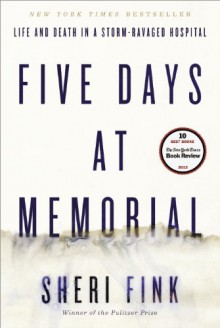
It was hard to put down this impressive work of journalism that focuses on events at Memorial Hospital in New Orleans before, during, and after Hurricane Katrina. As hurricane season approaches it begs the question: are we better prepared to deal with natural disasters in the U.S.? The epilogue to the book, written a few years ago, suggests in some ways we are, but in important ways we are not.
Hospitals were exempt from the evacuation order (belatedly) given by the mayor of New Orleans as Katrina approached. Many staff, patients, family members, and even pets sheltered at the hospitals (lesson the first: evacuate before the storm hits), including Memorial. As the title indicates, it would be five days before all were evacuated. After power loss, the generators eventually failed as they were in the basement, where the water levels rose once the levees broke. Though they had food and bottled water, the hospital went without running water, air conditioning, working plumbing, and the power needed to run vital medical equipment.
Evacuation aid via helicopters and boats was erratic or turned away by staff at points. Communication at all levels was unreliable; rumors swarmed, including that New Orleans was under martial law and looting and violence were everywhere. The staff went without much sleep as they continued to care for patients. The bad decision was made to leave the sickest patients, including those with DNR (Do Not Resuscitate) orders, last for evacuation, with the exception of neonates. Healthier patients (though some still critical) left first. Family members were encouraged and even pressured to leave their loved ones, assured the patients would be cared for.
Soon after the disaster, there was a reckoning. Or, I should say, an attempt at a reckoning. Troubled reports of irresponsible and ethically questionable decisions being made at hospitals and nursing homes arose, including euthanasia at Memorial. 40-some patients had died there, and about half were later found to have high levels of morphine as well as Versed, a sedative, in their systems. Were they euthanized, and by whom?
In addition to covering events at the hospital as reported by those who were there, Fink covers the development of the legal case against a particular doctor and two nurses accused of second degree homicide. Reading about what happened at the hospital, the good and, mostly, the bad, is heartrending and horrifying, impossible to look away from, like a car accident. Learning what does and does not happen afterwards infuriated me; my sympathies were with those who'd lost loved ones, who don't quite have closure. I sympathized also with nurses so traumatized by those five days that they could no longer practice.
Fink contextualizes Katrina as well as the ethics of decisions made. She profiles key players, letting their own words speak for them. I don't pretend to read much non-fiction, but it seems to me her work is exceptionally well researched, every effort made to fact-check and communicate with those involved. The book evolved from a piece she did for ProPublica and the New York Times, which won the Pulitzer. Regardless, I'm sure there's been a range of reactions. If you google the topic, you'll find a website by/for the doctor arrested who continues to deny wrongdoing, with a link to another site that proclaims "the truth" of what happened. I didn't bother clicking.
Mostly I think about the contrasting example of Charity Hospital, also in New Orleans, who lost fewer patients despite having more, with additional patients delivered to them. I think of proposed (and adopted) legislation or protocols that would shield physicians from legal ramifications of unethical decisions made during a disaster. I think of the following quote, with which I agree:
“Rather than thinking about exceptional moral rules for exceptional moral situations,” Harvard’s Dr. Lachlan Forrow, who is also a palliative care specialist, wrote, “we should almost always see exceptional moral situations as opportunities for us to show exceptionally deep commitment to our deepest moral values.”


 Log in with Facebook
Log in with Facebook 








